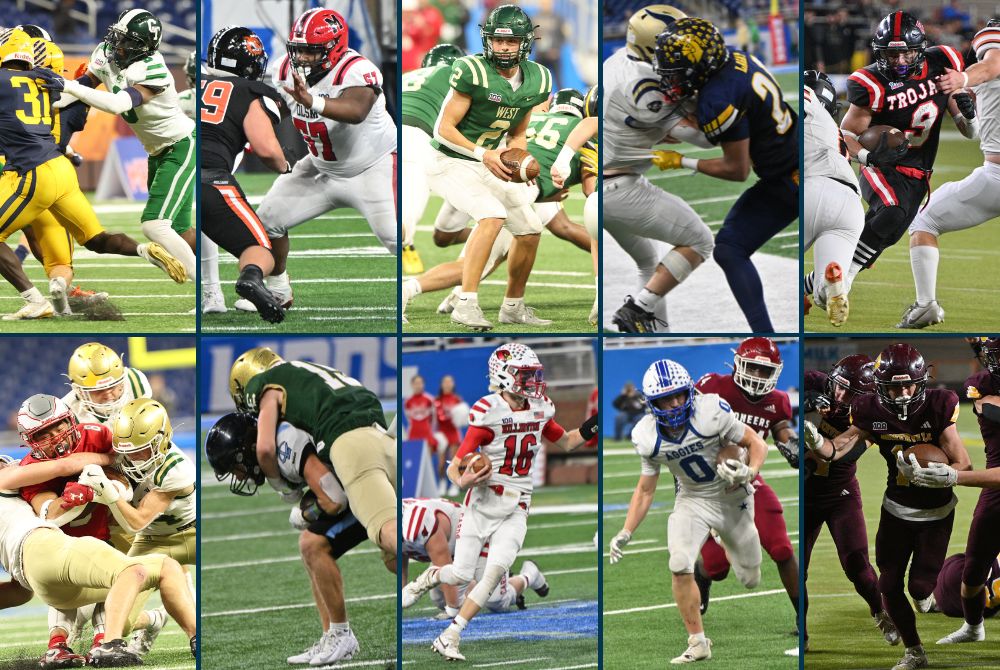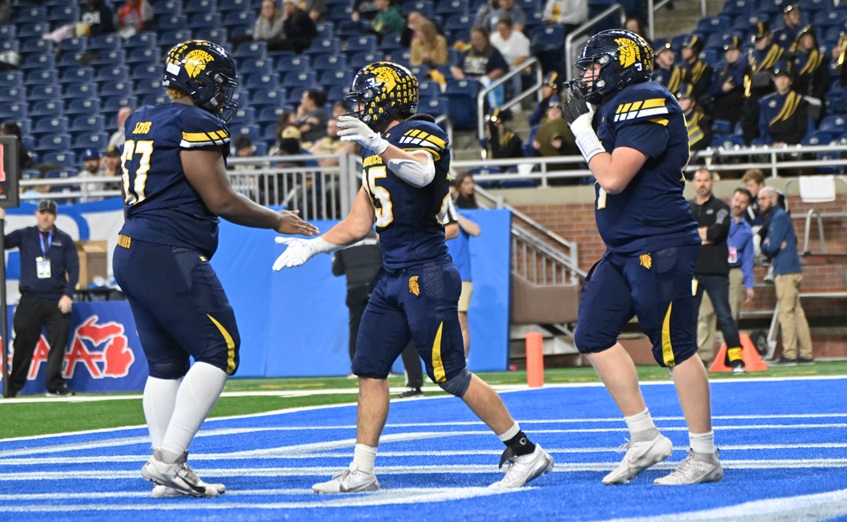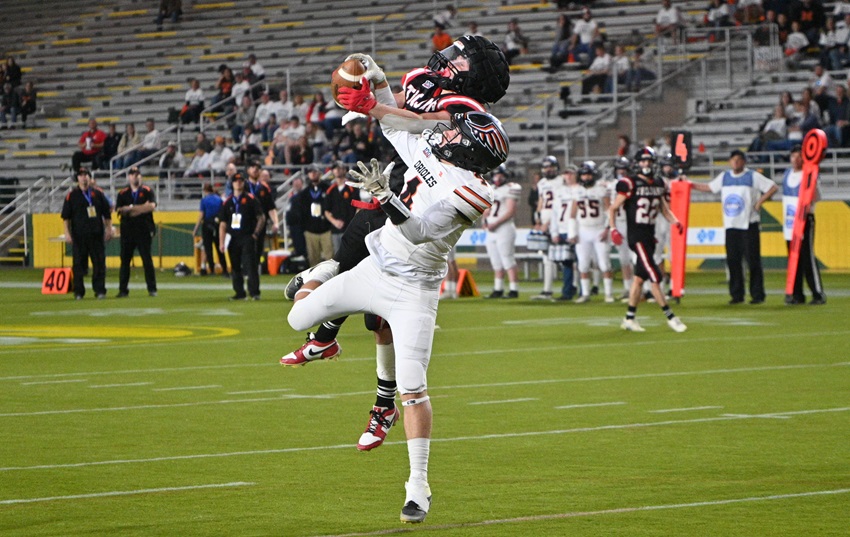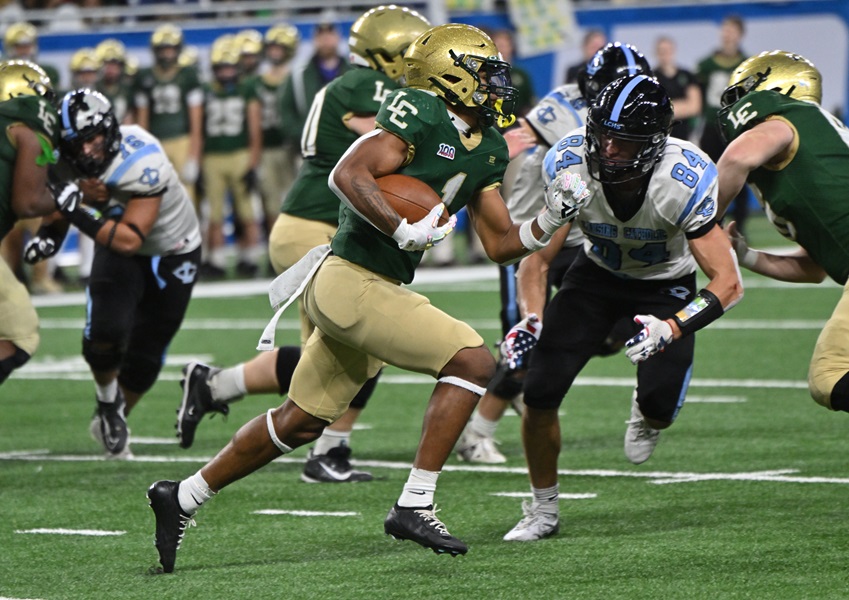
Beecher Becoming a Football School Too
November 14, 2012
By Bill Khan
Special to Second Half
FLINT — Basketball is a source of pride at Flint Beecher, with a tradition of excellence that includes four boys and two girls MHSAA championships.
Courtney Hawkins is as proud as anyone, having played on the 1984-85 and 1986-87 championship teams.
But hoops mania is also a source of frustration for Hawkins, the school's football coach and athletic director.
Where basketball is king, other athletic programs can sometimes suffer, as more and more kids are persuaded into specializing in one sport and playing in travel leagues outside of their high school season.
If you want to get Hawkins up on his soap box, ask him about the effect AAU basketball has had on the overall athletic program at Beecher.
Mr. Hawkins, the floor is yours ...
"It kills me to watch some kids who, you know just from the stuff they can do athletically, would be a heck of a football player or could contend for the state championship in the 100 meters or high jump," Hawkins said. "It's absolutely sickening. There are only so many basketball scholarships. They still haven't figured it out. Every year when basketball season is over, there are a number of kids who won't get scholarships, because there are so few. Every single year, there's a handful of boys -- every year -- who come to me and say, 'Coach Hawkins, I wish I would've played football and track.' It's happened seven years in a row and it will happen this year.
"AAU basketball is great. It makes everything seem so good. They get to travel across the country. AAU basketball is big business. It's not the best for every kid, especially when they tell these kids they're going to be the next LeBron James and the next year I see them at the store."
 Hawkins needs only to offer up himself as an example of how an athlete can have success beyond high school while still playing multiple sports as a prep. He was an all-stater in football, basketball, and track and field before focusing on football at Michigan State University. Hawkins went on to play nine seasons as a wide receiver in the NFL. He was a key member of MHSAA championship teams in basketball and track.
Hawkins needs only to offer up himself as an example of how an athlete can have success beyond high school while still playing multiple sports as a prep. He was an all-stater in football, basketball, and track and field before focusing on football at Michigan State University. Hawkins went on to play nine seasons as a wide receiver in the NFL. He was a key member of MHSAA championship teams in basketball and track.
Beecher's reputation as a basketball school may finally be changing, albeit slowly.
Hawkins has only two members of last year's Class C championship basketball team on his football roster, but hopes that the team's first-ever run to the MHSAA Semifinals opens some eyes among hoopsters around school.
Beecher (8-4) will face Detroit Loyola (12-0) at 1 p.m. Saturday in a Division 7 Semifinal at Fenton High School. The Buccaneers get a Second Half High 5 this week after overcoming a 3-4 start to make the playoffs as an additional qualifier at 5-4 before winning three postseason games for the first time.
Beecher hopes to become only the fourth team with four losses to win an MHSAA championship. The Buccaneers can look to nearby Flint Powers Catholic, last year's Division 5 champion, for proof that it can be done.
"I didn't want to tell the team that, because they don't like other teams, but I looked at Powers coming in 5-4 and thought, 'Why can't we do the same thing?'" said senior Kermit Craig, a defensive end and tight end.
Beecher is in the playoffs for the sixth straight year, but this was the most unlikely team to advance this far. Beecher's other playoff teams won at least six games, including a 9-0 squad in 2009 that was bounced in the first round.
"Yeah, I'm surprised, but one thing we do is work hard every day," said senior Eric Cooper, a wide receiver and free safety. "I just came to practice every day motivating all the guys to work hard, keep their heads up, and we're going to get a blessing. That's what we got."
The Buccaneers squeaked out a 21-20 victory over Mt. Morris on Oct. 12 to begin their current five-game winning streak. Their crowning achievement so far was knocking off defending Division 7 champion Saginaw Nouvel in the Regional Final, 19-15. Now they're one victory away from a trip to Ford Field.
"I guess with the youth and the fact we snuck in at 5-4, it's surprising that we went this far," Hawkins said. "But with that being said, the way that they've worked and the way they've stayed committed, it's been one of my best groups from that standpoint. I've had some groups that had more success early in the season. This team has great senior leadership. We have some young kids who are just phenomenal in terms of following the senior leaders. They're very coachable, very good kids. This is my first year of having some kids who don't want to play basketball. My starting quarterback, (freshman) Marcus Wright, said, 'Coach, I'm a football player.' We don't get many of those here at Beecher."
There was a time when playoff appearances, let alone trips to the Semifinals, seemed more unlikely than what this 5-4 team has achieved in this postseason.
Hawkins returned to his alma mater in 2006 to take over a program that had 11 straight losing seasons. After a 2-7 inaugural season that saw considerable improvement, Beecher has gone 45-20 while playing as the smallest school in the Genesee Area Conference's Red Division.
"We had to change the attitude," Hawkins said. "There were a lot of people who were, 'We play basketball at Beecher.' That was the approach. Then there was the losing attitude throughout the whole football program. The first year, we were 2-7. We were in a lot of games, but you could see the losing attitude from being beat down all those years. We as a coaching staff stayed on them."
The fact that Hawkins would return to the community after an NFL career gives him considerable credibility with his players.
"That means a lot," Craig said. "Most people look up to him as a father. He came to build the program and led us to where we are now. I learned a lot from him. As a young man, I look up to him. If I have problems, I go to coach Hawkins and talk to him about it. He's more a man than a football coach. He leads you to the right way."
PHOTO: (Top) Beecher linebacker Tyrik Wicks (20) wraps up Saginaw Nouvel's Ryan Sullivan (4) as sophomore Mike Herd (15) also pursues during last weekend's Regional Final. (Middle) Flint Beecher coach Courtney Hawkins, who also played at Michigan State and in the NFL. (Click to see more from the Regional Final at HighSchoolSportsScene.com.)

1st & Goal: 2024 Finals in Review
By
Geoff Kimmerly
MHSAA.com senior editor
December 4, 2024
The story of the 50th MHSAA Football Playoffs may have been driven as much by the run-up to the Finals of these last two weekends as by those 10 championship games themselves.
 But those games at Ford Field and the Superior Dome left us with their shares of unforgettable moments as we celebrated another special moment of this overall 100th MHSAA anniversary.
But those games at Ford Field and the Superior Dome left us with their shares of unforgettable moments as we celebrated another special moment of this overall 100th MHSAA anniversary.
Goodrich, Pontiac Notre Dame Prep and Millington celebrated championships for the first time. Jackson Lumen Christi moved into first all-time with its 14th Finals title. The average margin of victory may not have been close this time around – winners did so by nearly 24 points, and we had just one single-digit game out of 10 – but consider as well the excitement generated on the way to these concluding weekends. Of the 20 teams ranked Nos. 1 or 2 by the Michigan High School Football Coaches Association at the end of the regular season, only five reached championship games – and only three won them.
We had senior standouts rewrite the scoring side of our 11-player Finals record book, star quarterbacks face off in an 8-player classic, and an uncountable number of unforgettable moments as nearly 45,000 fans traveled to witness the beginnings of our latest trophy celebrations.
MHSAA.com once again covered all 10 championship games, with quick recaps and links to those stories below followed by notations of performances entered into the MHSAA Finals record books and a report on some of the main storylines to emerge as those championships were being decided.

Finals in Review
11-Player Division 1: Detroit Cass Tech 42, Hudsonville 20 – Read
The Technicians won their fourth championship and first since 2016 by shutting down Hudsonville’s powerful rushing attack and dominating the air with freshman quarterback Donald Tabron II completing 15 of 20 passes for 176 yards and three touchdowns to arguably the top receiving group in the state. Cass Tech built a 35-0 lead by a minute into the second half.
11-Player Division 2: Orchard Lake St. Mary’s 35, Byron Center 19 – Read
Orchard Lake St. Mary’s also won its first championship since 2016 with a mostly second-half burst after trailing 13-7 until the final minutes of the second quarter. Darrin Jones and Bryson Williams both ran for more than 100 yards and a pair of touchdowns as the Eaglets also shut down a Byron Center offense that averaged nearly 40 points per game entering championship weekend.
11-Player Division 3: Zeeland West 42, Detroit Martin Luther King 22 – Read
Paced by a record-setting performance by running back Keaton Hendricks, Zeeland West and its T-formation attack defeated a fourth top-seven ranked team during this playoffs. The Dux presented a look King hadn’t seen in years and turned it into not only a 352-295 total yardage advantage but also a 30:10-17:50 edge in time of possession as it piled up points against a King defense that had given up just 13.6 per game on the way to the Final.
11-Player Division 4: Goodrich 35, Niles 6 – Read
Goodrich won this matchup of finalists seeking their first championship, dominating the line of scrimmage to the tune of a 424-96 advantage in total yardage. Chase Burnett did the most damage of a talented Martians group of playmakers, running for 157 yards and a pair of scores while their defense locked down a Niles attack that averaged 41 points per game entering this matchup.
11-Player Division 5: Pontiac Notre Dame Prep 42, Frankenmuth 7 – Read
This also featured a pair of first-title hopefuls, and Notre Dame Prep took one home coached by Pat Fox, who grew up in and has since moved back to Frankenmuth. Quarterback Sam Stowe starred for the Fighting Irish, throwing four touchdown passes as NDP took a 35-0 lead into the fourth quarter and frustrated a Frankenmuth attack that had outscored its opponents by 31 points per game.
11-Player Division 6: Jackson Lumen Christi 56, Lansing Catholic 18 – Read
Lumen Christi’s record-setting win came on a record-setting performance by running back Kadale Williams, who ended up with a combined 590 yards and eight rushing touchdowns over his last two Finals appearances after also carrying the ball once in the Titans’ 2022 championship game. Lumen’s title was its third-straight with the first two of this string coming in Division 7
11-Player Division 7: Millington 24, Monroe St. Mary Catholic Central 0 – Read
Millington finished its first championship run as also the only undefeated 11-player champion this season. The Cardinals were physically dominant as they posted their fifth shutout and lowered their points allowed per game average to 7.7. In this win, they allowed just 3.2 yards per carry and forced three turnovers, limiting an SMCC offense averaging 36 points per game entering the weekend.
11-Player Division 8: Beal City 43, Riverview Gabriel Richard 14 – Read
Physical play and a strong running game were the story of this championship decider as well as Beal City won its third title and first since 2009 behind 315 rushing yards. The Aggies strung together unanswered runs of 21 and 17 points and held Gabriel Richard scoreless for the final 22 minutes of the first half and final 12 of the second.
8-Player Division 1: Deckerville 30, Pickford 28 – Read
Pickford led until the opening seconds of the fourth quarter as Deckerville came back from a double-digit third-quarter deficit to win its first championship since 2012. Both teams entered the matchup undefeated, and both relied on star quarterbacks who wrote their names into the Finals record book.
8-Player Division 2: Crystal Falls Forest Park 42, Morrice 20 – Read
The Trojans played in their 15th championship game and won for the fifth time after taking a 28-0 lead into the break and running for 184 of their total 291 yards during the first two quarters. Coach Brian Fabbri, who had played for Forest Park in 11-Player Finals in 2004 and 2005, became the fourth title-winning coach in program history.

Records Report
Zeeland West senior Keaton Hendricks scored a Finals record six touchdowns – to also give him a Finals-record 36 points. He rushed for three and caught three scores, and the three receiving touchdowns tied for second-most on that list.
Before Hendricks’ accomplishments a day later, Jackson Lumen Christi senior Kadale Williams briefly sat atop four record book lists. He remains the record holder with 314 rushing yards and five rushing touchdowns and sits tied for second with five total touchdowns and 30 points scored in a championship game. His 314 rushing yards also put him on the total yardage list.
Junior quarterback Sam Stowe directed Notre Dame’s offense during the championship drive, reaching the record book with 293 yards passing and four touchdowns through the air including one score on one of the longest completions in Finals history – 87 yards to Billy Collins. Stowe also ran for eight yards, making the total yardage list with 301.
Lansing Catholic senior quarterback Alex Fernandez earned multiple record listings with 284 passing yards, 21 passing completions and 366 total yards; he also ran for 82. Senior receiver Xavier Luea tied for the fifth-most receptions in a championship game, pulling in 10 for the Cougars.
Four kickers reached the record book list for most extra points in one game. Jackson Lumen Christi senior Andy Salazar tied two others for the record with eight extra points, making all eight kicks he took in the Division 6 Final. Notre Dame Prep junior Owen Fulsher made six extra points in six attempts, and Orchard Lake St. Mary’s freshman Beckett Kiefer, Beal City senior Kyle Martin and Goodrich senior Landon Williams all made the list with five extra points in five tries.
As noted above, Jackson Lumen Christi set a record for championships with 14, breaking its tie with Farmington Hills Harrison (which closed at the end of the 2018-19 school year). Lumen scored 42 points during the first half of its Division 6 win, tying for third-most in one half, and its 56 total points tied for second-most for a full title game. The Titans also tied a record with seven rushing touchdowns total and made the list – with Niles in Division 4 as well – for fewest pass attempts, with three.
Lansing Catholic made the team list for most pass completions with 21, and Notre Dame Prep made the team list for passing yards with 293.
As seems to make sense with some of our winning teams’ offensive successes, four made the list of those to not punt during a Final – Zeeland West, Beal City, Goodrich and Jackson Lumen Christi. West also combined with Detroit Martin Luther King, and Beal City with Riverview Gabriel Richard, to make the list for fewest punts by both opposing teams combined. Both pairs had just one in their games.
Although in defeat, Pickford senior quarterback Tommy Storey was one of the stars of the 8-Player Finals, making lists with four total touchdowns, 304 rushing yards (ranking second), four rushing touchdowns and 312 total yards. His opposing quarterback, Deckerville senior Hunter Garza, also made multiple lists with 323 total yards and 225 rushing.
Crystal Falls Forest Park sophomore Dietrich Rasner made the extra points list, tying for second with six in six attempts, and Morrice senior Joel Fisher had the second-longest punt return in 8-Player Finals history bringing one back 85 yards for a score.
Pickford and Deckerville both reached 300 yards rushing in the Division 1 game, Pickford with 322 and Deckerville just missing the record book yardage list but setting a record with 60 rushing attempts. Deckerville also made the first downs list with 21.
Crystal Falls Forest Park made a rushing list, with six touchdowns running the ball. The Trojans also set a record by not allowing Morrice to gain a yard passing – with the Orioles becoming the first 8-player team to not complete a pass in a Final, attempting just four.

Stories Behind the Scores
Lumen Legend: Of Jackson Lumen Christi’s now-14 Finals championships, 12 came under the leadership of coach Herb Brogan, who took over the program in 1980 after Jim Crowley led the Titans to titles in 1977 and 1979. They finished this season 13-1, putting Brogan’s career record at 421-96. He’s third in football coaching wins in Michigan high school history, trailing Al Fracassa (Royal Oak Shrine Catholic/Bloomfield Hills Brother Rice) by nine and John Herrington (Farmington Hills Harrison) by 22. Brogan’s all-time winning percentage of .814 has him fourth all-time on that list for coaches with at least 200 victories.
Welcome to the Finals: Of the 20 teams that played in championship games (11 and 8-player combined), only Lumen Christi was returning from 2023. Compare that to two years ago, when we had four repeat champions, or last year with six returning teams and two repeat champs. Over the last two weekends, five teams played in championship games for the first time, and as mentioned above, three celebrated their first titles.
Return of the Rush: Wide-open pass-heavy offenses have been a trend going on two decades. But the ground game may be making a comeback. Lumen Christi’s Williams set the individual rushing record in his team’s win over Lansing Catholic, and it’s fair to consider the offenses of at least 15 of the 20 finalists (11 and 8-player combined) as rush-based. Six teams reached 300 yards rushing in championship games, with Lumen leading the way with 435 on 47 carries.
MHSAA.com's weekly “1st & Goal” previews and reviews are powered by MI Student Aid, a division within the Department of Lifelong Education, Advancement, and Potential (MiLEAP). MI Student Aid encourages students to pursue postsecondary education by providing access to student financial resources and information. MI Student Aid administers the state’s scholarship and grant programs that help make college Accessible, Affordable and Attainable for you. Click to connect with MI Student Aid and find more information on Facebook and Twitter @mistudentaid.
PHOTOS (Top) This collage shows action photos from all 10 MHSAA Finals played this season. (2) Goodrich's Chase Burnett, middle, celebrates his touchdown with two of his linemen. (3) Forest Park and Morrice players get tangled up jumping near the goal line to pull down a pass. (4) Lumen Christi's Kadale Williams (1) works to get to the edge against Lansing Catholic. (11-player photos by Hockey Weekly Action Photos; 8-player photos by Cara Kamps.)

